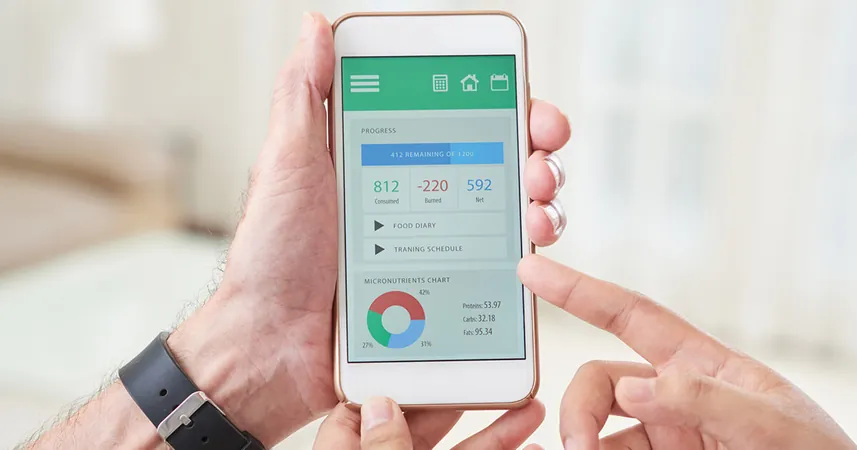
Unlocking Health: How Smartphone Apps Are Revolutionizing Management of Neurological Conditions
2025-08-07
Author: Arjun
Transform Your Health with Technology!
Meet Stacee Hawkins, a 56-year-old video producer from Houston who’s changing her life with the help of an app. After her Parkinson’s diagnosis four years ago, she started using StrivePD, a smart app linked to her smartwatch. This innovative tool tracks everything from muscle spasms and tremors to diet and sleep, showing Hawkins just how much exercise speeds up her medication's effectiveness and alleviates her tremors.
Apps: A Game Changer for Neurological Conditions
Hawkins isn’t alone in her digital health journey. For people living with neurological disorders—like epilepsy, migraines, chronic pain, and more—smartphone apps are proving to be invaluable resources. Dr. Benjamin Kummer, a neurology expert, emphasizes the wealth of apps available that empower users to monitor and manage their health. Those who embrace technology can find these digital tools greatly enhance their quality of life.
Tracking Migraines Like a Pro!
Lisa Wetchler, a 39-year-old migraine sufferer, has turned to Headway: Migraine Monitor. This app allows her to log symptoms and identify migraine triggers, which can often be obscured in the haze of pain. "It helps me recognize patterns I wouldn’t have noticed before," she explains. Awareness gained from these logs prompts her to take medications earlier, increasing their effectiveness.
Revolutionizing Doctor Visits and Record Keeping
Smartphones are redefining how we engage with healthcare. Jen Zupon, 50, utilizes her phone to prepare for doctor visits by jotting down questions and taking notes during appointments. This method ensures she maximizes her time with specialists. Moreover, that built-in health app? It's more than just a pedometer; it can be pivotal in tracking vital health metrics like blood pressure!
Symptom Management Made Simple
From epilepsy to multiple sclerosis, there are specific apps that allow users to log symptoms, treatments, and lifestyle choices. These logs can reveal vital trends and facilitate discussions with healthcare providers, potentially guiding therapy adjustments. Some apps even allow data sharing directly with medical teams. For patients like Hawkins and Zupon, this means getting tailored care based on real, measurable data.
Wearable Tech: The Future of Health Monitoring
The rise of wearables tied to smartphone apps is another frontier in managing neurological conditions. These devices can detect tremors and seizures, providing immediate insights into the user’s condition. While not foolproof, they alert patients to fluctuations in their symptoms, making it easier to respond proactively rather than reactively.
Empowering Caregivers and Providing Education
With features catered to caregivers, many apps equip families to better understand and manage the complexities of caring for loved ones. Whether it's monitoring behavioral changes in dementia patients or tracking rehabilitation activities after a stroke, technology is bridging gaps between patients, caregivers, and healthcare providers.
Stay Informed and Engaged!
These apps not only assist individual users but also keep them informed about their conditions. For instance, apps offering curated content about MS, stroke, or cerebral palsy help users stay educated on new treatments and research to discuss with their doctors.
The Road Ahead: Caution and Awareness Required
While embracing this digital health revolution presents incredible opportunities, users should approach with caution. Not all apps are rigorously tested, and data privacy remains a concern. Healthcare specialists urge patients to discuss any app usage with their doctors to ensure safe and effective integration.



 Brasil (PT)
Brasil (PT)
 Canada (EN)
Canada (EN)
 Chile (ES)
Chile (ES)
 Česko (CS)
Česko (CS)
 대한민국 (KO)
대한민국 (KO)
 España (ES)
España (ES)
 France (FR)
France (FR)
 Hong Kong (EN)
Hong Kong (EN)
 Italia (IT)
Italia (IT)
 日本 (JA)
日本 (JA)
 Magyarország (HU)
Magyarország (HU)
 Norge (NO)
Norge (NO)
 Polska (PL)
Polska (PL)
 Schweiz (DE)
Schweiz (DE)
 Singapore (EN)
Singapore (EN)
 Sverige (SV)
Sverige (SV)
 Suomi (FI)
Suomi (FI)
 Türkiye (TR)
Türkiye (TR)
 الإمارات العربية المتحدة (AR)
الإمارات العربية المتحدة (AR)